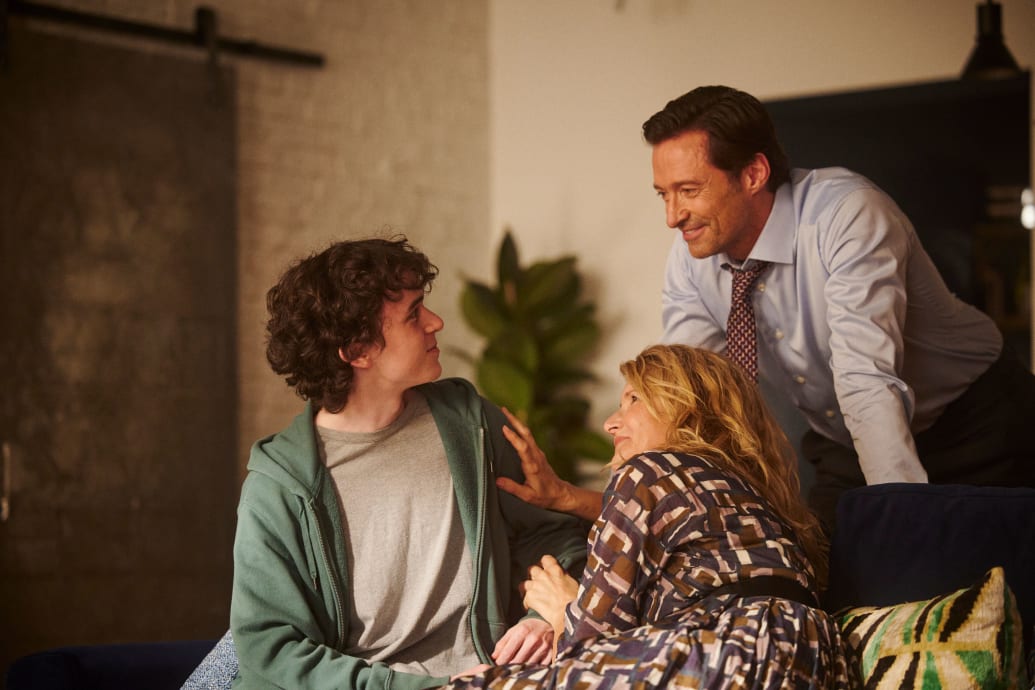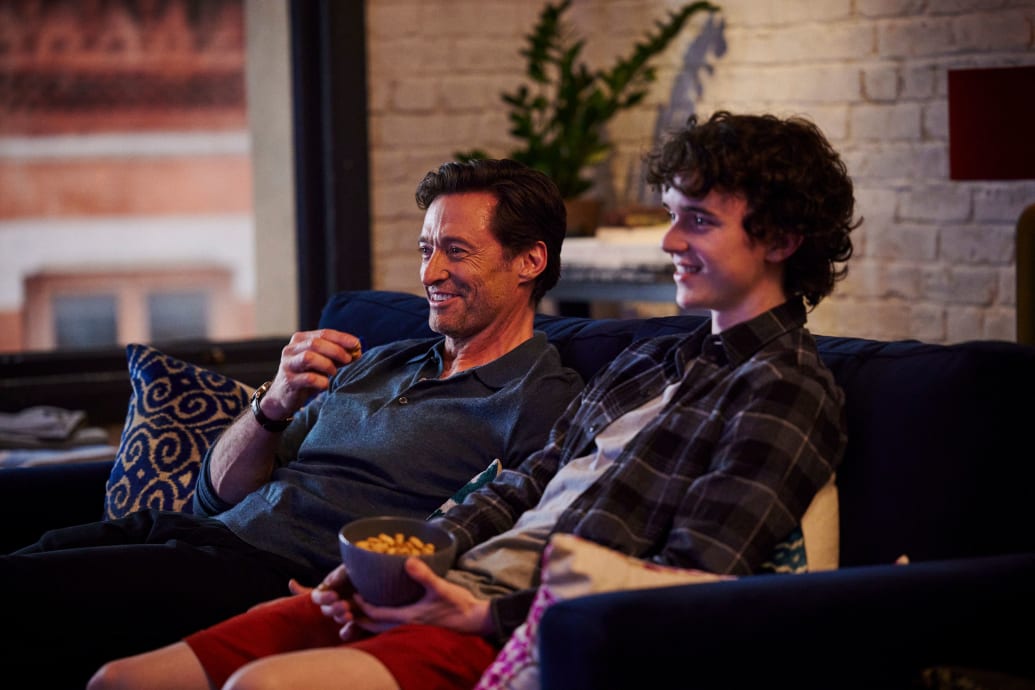When I watched The Father back in 2020, I was astonished. The film, about a man named Anthony (Anthony Hopkins) suffering from Alzheimer’s, and his strained relationship with his daughter (Olivia Colman), was an authentic portrayal of what it’s like emotionally to deal with a difficult illness. Films about Alzheimer’s tend to focus on the perspective of the one suffering, but The Father dared to reckon with how the people around them suffer as well.
The film was the accomplished debut from writer-director Florian Zeller, who adapted his own play to brilliant effect. The film went on to earn six Oscar nominations, winning two—one for Best Screenplay, the other for Best Actor (for Hopkins). That’s an impressive haul for a first film—but not a surprising one, based on how well the film explored Anthony’s interiority. Through his masterful handling of diegetic space and storytelling, Zeller immediately reached the top of my radar, and I awaited his next project with great anticipation.
That next project is here—and it’s The Son, also based on one of Zeller’s plays. (The Holy Ghost isn’t yet in the works, but I choose to hold out hope.) The film follows Nicholas (Zen McGrath), a 17-year-old who feels like he can’t live with his mother Kate (Laura Dern) anymore. He seeks refuge from his inner turmoil by moving in with his father Peter (Hugh Jackman), a successful businessman, Peter’s new partner Beth (Vanessa Kirby), and their infant son. But Beth meets Nicholas with trepidation, and Peter receives a major new job opportunity, so he barely gives his son the time of day.
But Peter needs to start paying attention, as Nicholas is in crisis. It turns out he hasn’t been to school in a month, something that stuns both Kate and Peter. In a moment between Nicholas and his father, he makes his pain clear, saying “I don’t know what’s happening to me.” It’s clear their son needs help that neither of them can provide—or rather, it’s clear to everyone who’s watching the film, but this staggeringly obvious fact seems to elude both parents for some time.
It pains me to say that The Son isn’t merely a disappointing follow-up to The Father. It’s also a dreadful, irresponsible movie. The real issue is its fatal misunderstanding of mental illness: it’s like every line is read directly from a pamphlet called “How not to talk about mental health.” All of this is manifested in the film’s gobsmackingly awful ending. If for some reason you’re still keen to see The Son—and I wouldn’t blame you; I was excited once—now is the time to leave, because a whole lot of spoilers are coming your way. (I’m not entirely sure you can spoil a movie like The Son, which telegraphs its every move, but hey, I can understand not wanting to know the ending before you see it.)
Rekha Garton/Sony Pictures Classics
Things have been getting progressively worse throughout the film—for Nicholas, for his parents, and frankly, for everyone watching—and every moment it seems as if things will improve, they end up getting worse. In one moment, Nicholas happily dances with his father and Beth, and seconds later, Peter and Beth embrace and completely forget that Nicholas is even there. Another scene finds Nicholas offering to babysit his baby half-brother, only for Beth to freak out over the mere idea of a “weirdo” like Nicholas taking care of her child. This constant—and I really do mean constant—cycle of lifting Nicholas up and letting him down makes the film’s conclusion even more obvious.
After all the mistakes and slights his parents make that would feel right at home in an after-school special, Nicholas finally attempts to take his own life. Thankfully he’s found in time, and Nicholas’ parents decide to put him in intensive psychiatric care. Well, it’s not so much that they decide to get Nicholas the help he needs; it’s more that a physician forces their hand to do so, and they acquiesce.
Finally, there’s a sense of peace. It feels like, with Nicholas away in treatment, Kate, Peter, and Beth can finally live their lives without the burden of their depressed son. That’s a rather dreadful sentiment, and my skin crawled even writing those words. But The Son isn’t the masterclass in sentimentality and understanding it so clearly thinks it is. Its self-importance and overbearing score bludgeons you over the head, making it hard to ever come across as sincere. (Hans Zimmer, you betrayed me.) What the film really seems to be saying is that without a problem like Nicholas (ugh), these people can get on with their lives (ick).
The most pivotal scene comes after this when Kate and Peter meet with the doctor in charge of Nicholas’ care. He’s stern but professional, warning them that when reintroduced momentarily to their son, he will immediately beg and plead to be taken home. The doctor explains that he’s seen this happen repeatedly, and it’s imperative for the patient to remain in the hospital’s care. The doctor couldn’t be clearer: allow Nicholas to come home, and it’s nearly certain that he’ll attempt to take his own life again.
What follows is a lot of screaming and crying, as Nicholas does exactly what the doctor says he’ll do. This could (and really should) be a hugely emotional scene, but everything feels so hollow. The film has made it clear over and over that it doesn’t care about Nicholas, and frankly, neither do his parents. They think that they do, but they’re so invested in themselves and their own lives that they see right past him. It’s disingenuous to have Nicholas beg and plead to people who look completely devastated; it’s deeply distasteful and upsetting, considering we’ve watched the film torture him with no repercussions. Worse, it’s clear that what we’re watching is acting, in more ways than one.
Ultimately, Kate and Peter do something right: They listen to the doctor and refuse to take Nicholas home. It’s a tough decision for a parent to make, but they do it, because they know he’s going to be better off in the long run. Or so you’d think. Moments later, they sit in a car on the way home, and the ridiculous music hits as they share a glance that tells you everything you need to know—these irresponsible people are going to keep being irresponsible.

Rekha Garton/Sony Pictures Classics
Soon after, Nicholas is back home with his parents. Beth has taken the baby to visit her parents, so it’s just Kate, Peter, and Nicholas again, the family unit he’s longed for but no longer has. There’s a moment of serenity as the three talk to each other, and Nicholas gives an extended monologue about how he loves his family. It should feel moving, but the film has done nothing to show it cares about Nicholas, so it’s just one of many moments to remind you that The Son is based on a play.
Literally mere moments after his parents mention that they shouldn’t let him out of their sight, Nicholas heads off alone to take a shower, which is apparently totally fine and doesn’t concern them in the slightest. It’s a red flag the size of North America, but Kate and Peter are too invested in themselves, and one another, to notice. There’s an eerie calm as the two speak to each other about going to a movie as a family, but it’s quickly punctured by the sudden bang of a rifle.
I’ll back up a second. Peter has a rifle in his apartment that was a gift from his father. The fact he never thought to remove the gun from the house he was bringing back his at-risk, suicidal child tells you everything you need to know. Finally, all of The Son’s worst Chekhovian instincts have come to fruition.
You’d think that’s where the film would end, but you’re wrong. We then move to the future, some years later, where Peter has a long conversation with Nicholas. Nicholas talks about how he’s so happy now—he’s found the love of his life and moved to Toronto, which makes him happier than New York City ever could. (As a Canadian, this is the only thing that rings true in the entire film. Sorry.) Nicholas has even written a book, which he dedicates to his father.
“Society has evolved long past The Son’s understanding of mental health.”
This is, of course, a complete fantasy. Nicholas is dead, and no amount of well-wishing can bring him back. In the real world, Peter sits bereft, as Beth comes to comfort him. The Son is so completely committed to its insensitivity and tone-deafness that the man who neglected his son’s endless pleas for help, even taking them as a sort of personal affront, would think his son would ever dedicate a book to him. It’s a moment that completely robs Nicholas of any agency, making it all about Peter and his experience of his son’s mental illness. Peter is the one who really had to suffer, after all, having a depressed son. It’s despicable.
The root of the problem is that the film, like Kate and Peter, constantly neglects Nicholas. The Son is far more invested in his parents—particularly Peter and Beth—and how they constantly fail their son by not understanding him, ignoring him, or blaming him for his own sadness, without holding them accountable for these actions. In a particularly heated moment (judging by the context, it’s supposed to be extremely dramatic with a capital D) Peter shouts at Nicholas, “When you hurt yourself, it’s as if you’re doing it to me.” Seriously. Maybe this would have flown five or even 10 years ago, but society has evolved long past The Son’s understanding of mental health.
The Son could have been an effective showcase of how insensitivity and a lack of understanding can lead to avoidable tragedies. Perhaps it should have been that. Instead, Florian Zeller forces us to sit through this plodding, grotesque, emotionally taxing, cruel story. It’s a film with such self-serving importance that it completely forgets the most important character, and he’s right in the title. The Son is an embarrassment, an affront to those suffering from mental health issues, and a dramatically inept story that relies on overwhelming musical cues, dull staging, and wooden acting to get its comically out-of-date script any semblance of life. This is the worst film, and the worst ending, of 2022.







